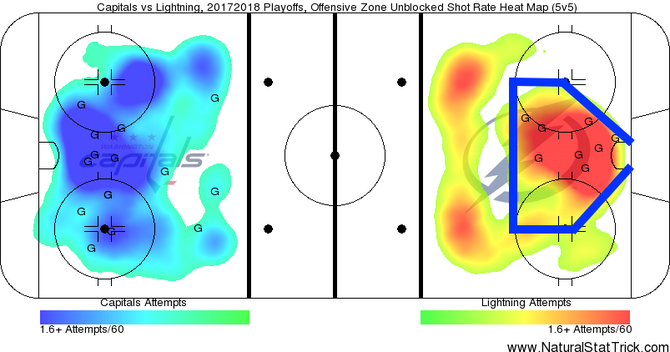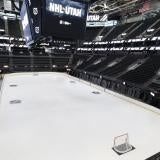The Tampa Bay Lightning are dead. After finishing the regular season with the Eastern Conference's best record and one of the league's best rosters, the Lightning have once again fallen short of their Stanley Cup hopes. This year, their run ends in the Eastern final, and at the hands of the Washington Capitals.
Yes, those Washington Capitals.
The Caps took down Tampa in seven games to punch a ticket to their first Stanley Cup Final in 20 years. So how the hell did that come to be?
Well, let's take a look at where things went wrong for Tampa Bay.
Too many 'empty calories'
Heading into this series, I expected Tampa Bay to be the better team at 5-on-5, and figured the best chance the Caps would have at winning would come via special teams.
In reality, the opposite was true.
Special teams did play a significant role in this series -- only Games 5 and 7 went without a measurable impact on the power play. And, at points, the Capitals did have a field day with the Lightning's lackluster penalty kill, going 3 for 7 on the power play in the first two games. But it was actually Tampa Bay that came away with the edge in production and efficiency.
The Lightning scored six times on 18 man-advantage opportunities, good for a 33.3-percent conversion rate. The Capitals scored four times on 17 opportunities (23.5-percent), with all four goals coming in wins.
However, too much of Tampa's production came from special teams -- 40-percent of their goals in the series came on the power play. The Caps were the better team at 5-on-5.
While 5-on-5 shot attempts were basically even -- Tampa Bay edged Washington by a single attempt, 314-313 -- the Capitals had a major advantage in shots on goal (177-144) and scoring opportunities (159-140).
To steal a line from NHL analyst Mike Kelly, the Lightning's possession numbers were basically full of "empty calories." They spent a lot of time in the zone, but much of it came without meaningful production. A good chunk of their attempts were either blocked or missed the net completely.
If you look specifically at Games 6 and 7 -- the two chances the Lightning had at closing out the series, and two games in which they were shut out -- the numbers are pretty staggering.
In Game 6, Tampa Bay had 53 shot attempts at 5-on-5 with only 21 of them (40-percent) getting put on net, and very few from high-danger areas. Their chances and shots weren't high quality. Meanwhile, the Capitals attempted 50 shots at 5-on-5, and more than half of them found the net. Even though Tampa held the advantage in zone time, the Capitals did more with it.
Though the Lightning were better in Game 7, it was a similar story with a similar fate. Tampa put about half of their 57 shot attempts at 5-on-5 on net, and some of them were high-danger opportunities, but ultimately they got nothing out of it. The Caps only managed 33 attempts, but they put 64-percent on net and scored three times at even strength.
Simply put, possession means nothing when you do nothing with it, and the Lightning couldn't find a way to do anything with it when it mattered most.
What happened to Tampa's stars?
A big reason why Tampa lost the 5-on-5 battle was because their stars were significantly outplayed. One of the Lightning's strengths is that they have depth and don't need to rely on their stars all the time, but they absolutely needed more out of their front-end players than what they got in this series.
Nikita Kucherov, who led the Lightning with 39 goals and 100 points during the regular season, was a major disappointment in this series. He scored only once (on the power play), led the team in minor penalties (four) and finished at a minus-6. He looked like a liability out on the ice at points and I would be shocked if he wasn't dealing with some sort of injury during this series. He just wasn't himself.
Lightning captain Steven Stamkos, who has been one of the team's most reliable playmakers in recent memory, led the team with four goals and six points in the series, but all of that production came on the power play. I'll reiterate: Stamkos didn't register a single point at even strength in these seven games. He was completely blanked over the final three games of the series, and he registered just four total shots in those three games.
The Lightning did some line shuffling in this series, but their usual top six accounted for just four goals at even strength all series -- two from Brayden Point, and two from Ondrej Palat.
Point, who centered the Lightning's shutdown forward line that had so much success against the Bruins in round two, finished as a minus-6 in this series. The only worse mark than that came from Tampa's Norris-caliber defenseman in Victor Hedman, who was a minus-7.
On the other side, the Capitals' stars were what you expected them to be. Evgeny Kuznetsov had four goals and 10 points. Alex Ovechkin added four goals as well. T.J. Oshie had seven points. John Carlson added five assists. Even Nicklas Backstrom, who was dealing with a serious hand injury that caused him to miss three games, gutted it out to put up three points in the four games he played. No Capitals players finished with a minus rating.
If you're hoping to find a spot in the Stanley Cup Final, you're going to need your best players to play like your best players. The Lightning's didn't, at least not at even strength.
Washington's violent desperation
In years past, the Capitals have been criticized for packing it in and not showing up when the games mean the most. Not having that edge that's needed in the postseason. Not wanting it enough.
Well, if that narrative wasn't already erased this year, all you need to do is look at the way they played and the physicality they brought in the final two games of this series.
Over those two games, the Capitals outhit the Lightning by a whopping 85-46 margin. And while 'hits' can often be a misleading or misvalued stat due to scorer's discretion and possession (the team that possesses the puck more is going to be hit more), this is a pretty fair representation of how much the Caps beat up Tampa down the stretch.
After losing three straight, Washington came out with a startling nastiness in Game 6 and absolutely punished Tampa's forwards at every given opportunity. They looked like a desperate team, but it was more of controlled urgency than stupid violence.
Ovechkin trying to do anything he can, with and without the puck. Too bad if the Capitals don't win, he'll be criticized for not doing enough these playoffs or not "wanting it enough" *yawns* pic.twitter.com/1FRO5s4A1c
— Shayna (@hayyyshayyy) May 22, 2018
That wrecking ball mentality seemed to take a toll on Tampa physically as well as mentally. They weren't as confident or as effective with the puck in the offensive zone, possibly because their forwards had to worry about which Capitals' player was going to steamroll them if they held onto the puck too long.
Braden Holtby saved his best for last
Goaltending, like this series, was bit of a back-and-forth affair. Andrei Vasilevskiy started the first two games in rough shape -- although he got almost no help from his teammates -- but bounced back to finish the series pretty strong.
Holtby started off great and then had a rough go of things when Tampa started to find their game in the middle portion of the series. Then, he picked a pretty phenomenal time to register his first two shutouts of the entire season.
Here's how things broke down
Games 1 & 2:
Vasilevskiy -- 10 GA, 52-62, .839 S%
Holtby – 4 GA, 52-56, .929 S%
Games 3-5:
Vasilevskiy -- 6 GA, 100-106, .943 S%
Holtby – 10 GA, 54-64, .844 S%
Games 6 & 7:
Vasilevskiy -- 5 GA, 50-55, .909 S%
Holtby – 0 GA, 53-53, 1.000 S%
Total:
Vasilevskiy – 21 GA, 202-223, .906 S%
Holtby – 14 GA, 159-173, .919 S%
Both goaltenders were probably more solid than the overall numbers suggest, as neither netminder was ever bad enough to warrant finger-pointing or a valid case that they cost their team a game. However, both guys were good enough to suggest they helped steal a game or two.
But there's more of a gap when you look at the numbers at even strength. Remember, a significant portion of the Lightning offense came on the power play in this series. At 5-on-5, Holtby gave up just eight goals in seven games with a save-percentage of .944. Meanwhile, Vasilevskiy gave up fifteen with a save-percentage of .912.
And when you look at the goal chart for those Lightning strikes at even strength, every single one of them came from "the house," or the most dangerous scoring area in the zone.

Basically, Holtby was great when his team wasn't outmatched and he didn't give the Lightning anything they didn't earn. Most importantly, he was lights out when the Caps had their backs against the wall and outplayed Vasilevskiy when it mattered most.
Say it with me…Caps' year!
So often throughout this postseason the Caps have distanced themselves from the ghosts of their playoffs past.
From dropping the first two games of the opening round and following through on Ovechkin's promise to charge back, to finally beating the Penguins and making it past the second round…this team has proved they have the resiliency and mental makeup that older Washington teams seemed to lack.
And almost just as importantly, they also have had a bit of luck.
These components don't always show up on the stat sheet but they're vital to success in the NHL playoffs, which can often be wildly random and unpredictable. A single bounce of the puck can change a team's fate.
Wildly enough, this may actually be the Capitals' worst team of the past three playoff runs, at least in terms of roster quality. But for all the talent that they've had in years prior, they seemed to lack some of the extra luck and will that helps push a team over the top.
Not this year. This is like the Bizarro Capitals.
Just look at the way Game 7 unfolded. Washington came out of the gate and Alex Ovechkin smashed a one-timer into the net just a minute into the game. That goal (ultimately the game-winner) held up despite a number of good chances from the Lightning.
Holtby was great, but Tampa also had no puck luck or finishing touch. They struck the post several times. Then, stuff like this.
Yanni Gourde gonna have nightmares about this one pic.twitter.com/xzArF4fWjI
— Pete Blackburn (@PeteBlackburn) May 24, 2018
Yikes. pic.twitter.com/kGNE9DApOO
— Pete Blackburn (@PeteBlackburn) May 24, 2018
And then, stuff like this.
Caps throw the puck off Girardi’s body, Burakovsky scores to make it 2-0 pic.twitter.com/QIwdyBTDQL
— Pete Blackburn (@PeteBlackburn) May 24, 2018
Those are the sort of miserable breaks that we've come to expect to go against the Capitals. This year, many of them are falling in Washington's favor.
Then you consider the fact that the Lightning generated almost nothing in the third period of Game 7 with their season on the line, including no shots through the first eight minutes of the frame, during which they had a power play! It was the type of "lay down and die" finish that Washington has often been blasted for in years past, and they were finally on the other side of it!
Maybe it's time we just come to terms with the idea that the Hockey Gods are finally repaying the Capitals for all the pain and suffering they've inflicted over the years, and maybe there's nothing anyone can do about it. The Lightning were the best team in the Eastern Conference this year, and not even they could kill the Caps.
The Caps might be a team of destiny, and there may not be a damn thing anyone can do to stop them.






















